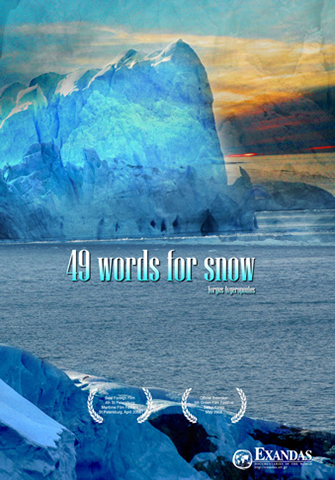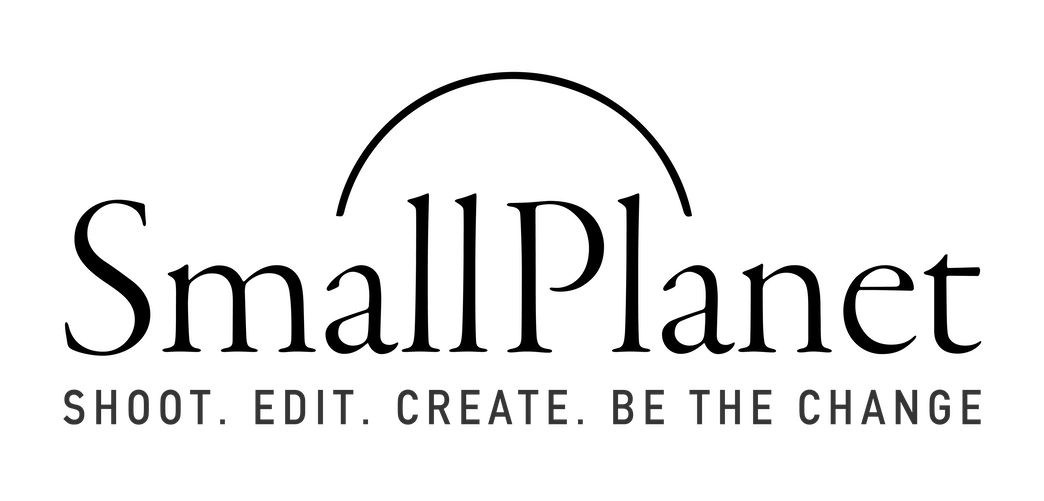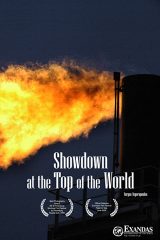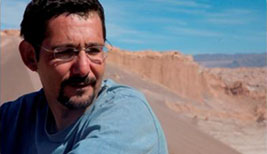
49 Words for Snow
Dir: Yorgos AvgeropoulosThe planet is suffering from high fever and its thermometer can be found in Greenland. In this vast land of ice which is now melting at a great speed (248 cubic kilometres of snow each year) all that we hear on the news and read about in the newspapers constitutes the everyday life of its few inhabitants.
The Inuit, better known to us as Eskimos, watch helpless as their life changes dramatically and their Arctic civilization receives what is probably the worst blow in its centuries long, frozen history. Traditionally hunters and fishermen, they watch as their pray disappears and their moving about becomes more and more dangerous due to the fragile ice and the unexpected weather changes.
The creators of this penetrating documentary spent weeks in isolated communities in Greenland, recording the life of the native Inuit. They also present new climate research results, more pessimistic than ever, while uncovering the new and regrettable “el dorado” of oil companies who are preparing to drill for black gold in the planet’s most vulnerable area.
Watch the Film Now!
Choose the language you prefer and stream the film in Full HD from any digital device. Enjoy your private screening!
Buy the DVD
Public Screening
Are you interested in organizing a public screening of our film? Send us an email with your inquiry and we will be glad to assist you!
Educational / Library Use
Are you interested in enriching the library of your institution with our film? Contact us and let's create together an informed public!
- DURATION: 63min
- AVAILABLE IN THE FOLLOWING LANGUAGES: English | Greek
- AVAILABLE VERSIONS: English (63min) | Greek (63min)
- YEAR OF PRODUCTION: 2008
- Written, Produced & Directed by: Yorgos Avgeropoulos
- Research Coordinator: Mathew Tsimitakis
- Production Manager: Anastasia Skoubri
- Director of Photography: Alexis Barzos
- Editing: Yiannis Biliris, Meletis Pongkas
- Original Music by: Yiannis Paxevanis
- Graphics: Sakis Palpanas
BEST FOREIGN FILM PRIZE
5th International Science Film Festival
St. Petersburg, Russia
April 2008
PRODUCTION NOTES
When, in October 2007, Yorgos Avgeropoulos and cameraman Alexis Barzos were flying to one of the most northern spots in the world, Greenland, they couldn’t imagine that notions like “climate change” and “global warming” could so eloquently be put down to sound and image. The ices are melting, that much is known, but it is one thing to read about it and another to see and hear it.
Avgeropoulos was keeping a diary with his thoughts: “We are 250 km. above the arctic circle. The pilot announces that ground temperature is -10 degrees Celsius. We are the only foreigners on board the small aircraft. Almost everyone else is Inuit or, as they are known to us, “Eskimos”. Alexis and I keep our eyes open to see what Martin Shroder, the scientist from the Danish Meteorological Institute had said: “watch the blue lagoons”. The lagoons appeared soon. Wonderful, big blue holes inside the eternal ice cover. Before they didn’t exist, they appeared in recent years due to the global warming. Now, they were passing by hundreds under the fuselage of the aircraft, forming beautiful, abstract patterns. If the global warming keeps up, until 2080 the icebergs and the ice that cover the sea will have disappeared. However, for the time being, what I see is a beautiful and serene image. The way here nature signifies, in the quietest of ways, its most violent change, is impressive.”
The planet is suffering from high fever and its thermometer can be found in Greenland. In this vast land of ice which is now melting at a great speed (248 cubic kilometres of snow each year) all that we hear on the news and read about in the newspapers constitutes the everyday life of its few inhabitants. For days, Avgeropoulos and Barzos were recording the life of the hunters and fishermen of the region in secluded communities, lived in their houses and followed them in their dangerous expeditions in the vast white of the ice.
Arnie is a hunter. He lives in this unfriendly place, like his Inuit ancestors used to for thousands of years now.
He usually hunts seals. “If it wasn’t for the seals, the Inuit wouldn’t have survived.” “From them we take their meat for food, their skin and fat for clothes and from whatever is left we feed the dogs for the sledges…” Arnie put on overalls over his clothes, yoked four of his twenty dogs to the wooden sledge, took the gun and his binoculars, said goodbye to the family and with a long shriek gave the signal for the dogs to take off. “There are three lagoons we have to cross”, he said. “We go quite far. If everything goes well we’ll get back in the evening”.
“I wondered inside what ‘if everything goes well we’ll get back in the evening’ meant, so I asked” wrote Avgeropoulos in his diary.
– If we don’t get back in the evening when are we getting back?
– Tomorrow.
– And where do we sleep?
With a move of the hand he showed me a tent and a lamp: “Outside” he answered. Almost an hour went by. The frozen wind was scratching our face. Sometimes on the sledge, sοmetimes pushing it, we were slowly travelling on the vast white landscape. The first lagoon appeared in the distance, its waters frozen. We would pass with the sledge over the ice and cross over. As we were getting closer, Arnie was becoming restless. He saw something we couldn’t see. He pulled the reins and the dogs stopped, barking. He got off the sledge and with his boots he started jumping up and down on the frozen surface. After a few stamps of his feet the first cracks appeared, which soon became more, allowing the water to come to the surface and swallow a big chunk of ice. “If we had passed through, maybe we would have been dead by now”.
This time of year, the lakes and sea waters should be a layer of ice so thick it would be capable of holding the weight of a car easily. During the last years though, the ice is growing thinner. This might be calculated in numbers by the scientists, but in the everyday harsh reality of the Arctic it means you can leave in the morning and never get back.
The Inuit watch helpless as their life changes dramatically and their Arctic civilization receives what is probably the worst blow in its centuries long history. Living in a harsh land with no vegetation, they were following their pray immigrating from one place to the next in order to survive. And they became one with the nature that surrounded them.
Typical proof for this is that they have invented not one or two, but 49 words to describe accurately snow and ice. They use a different word when they talk about the snow that falls (qaniit), a different one for the snow on the ground (aput), for snow that the wind blows into the house (sullarniq), for the chunk that has been detached from an iceberg (uukkarnit), for thin and ugly ice (aakkarniq) or for melting ice that forms rivulets (sikuaq). Τhis last word they use all the more often. Climate change for the Inuit doesn’t just have an impact on their finding food but on their identity itself, their culture and tradition.
Niels is a fisherman and since there is no ice in the sea anymore he can use his boat in the winter as well, something unheard of some years back. This however doesn’t help him with his job at all. When the sea would freeze, he would go with his sledge where he wanted on the icy surface, dig a hole in the ice and fish from there. Now he has to go quite far out at sea to have a decent catch, while the things he had learned from his father to predict the weather are not helping him at all anymore. The weather can change unpredictably in one day, strong winds might rise, storms might break.
Out in the open, some of his friends had started working and the seagulls were showing who was doing better. “Niels, watch out for the damn whales” someone shouted from afar. “Three have just passed by here”.
New species, unknown to these waters, have made their appearance. Whales that were living in Scandinavian waters, now that temperatures allow it, go up north swallowing massive quantities of food. With them fish come along that used to live in warmer climates chasing their food, sea micro-organisms that also recently immigrated here. Τhe domino of the disturbance of the ecosystem is continued with bird species that come from Europe and make the Greenland Authorities think that the country might be afflicted also by the bird flu.
Yorgos Avgeropoulos writes in his diary: Niels threw his trawl line, laughed and lit up a cigarette. In the simple and substantial language that is typical of the indigenous peoples worldwide, from Latin America to the Arctic, he started talking about the industrially developed countries. “They should all understand that they have to stop contaminating the planet. We all have the right to live. The wind, earth and sea don’t belong to anyone. They belong only to Mother Nature. For all the money they make, they cannot buy a new planet”.
While the ices are melting, however, and the scientists are warning for an oncoming disaster, the oil companies are already rejoicing. Greenland doesn’t have oil yet, but it has already set up a ministry of “Oil and Mineral Sources”. Everything indicates that in the near future, it will belong to the oil-producing countries. It has also set up a state oil company, Nuna Oil, which occupies only …5 people.
October 11, a historic deal was signed between the government of Greenland and the most prominent oil companies on the planet. The government gave permission to the companies to look for oil deposits. The search will take place at sea near the Ilulissat glacier that has been declared by UNESCO a “World Heritage Site”. Everyone stressed the importance of this move for the oil industry. Everyone said that now that the ices are melting the procedure of exploration and mining becomes much easier. “It is a wonderful opportunity”, the Minister said and his words were stifled by clapping.
“The deal was signed in the presence of very few journalists—among them Alexis and myself”, Avgeropoulos writes in his diary.
“I asked the companies’ representatives to answer some questions. They looked surprised.” “And what do we have to do with global warming?”, Κenneth Hanssen from Canadian Husky asked. James Zullig of Exxon Mobil, sat uncomfortably in his chair. The Danish Soren Gath, of Dong Energy, smiled as if he accepted the challenge. And Allan Pitts of Chevron asked for a two minutes break and called America. “Isn’t it a little paradoxical that while people are worried about the ices melting, something which will make sea levels rise as much as 7 meters you think that this is a wonderful business opportunity?”, I asked. “Our job is to explore for oil and bring it up on the surface”, said the Exxon Mobil representative. “We live in an uncertain world and we always have to adjust to the new circumstances”, said the Chevron representative. “It’s not our fault the ices are melting”, the Canadian of Husky said. “We give energy to the people and we have to keep doing it with hydrocarbons until we develop other alternative sources of energy”, said the Danish. None of them could guarantee that there is not going to be a leak, spill or accident that will destroy the environment. The deputy minister of oil in Greenland clarified a few things on the part of the government. “It is not us that have created the warming of the planet”, he said. “We are 60.000 people. The global warming was caused by the industrially developed states and it would be a great injustice for someone to deny Greenland the right to exploit its natural resources. Besides it is not just the oil. As ices are giving way to the land we discover gold and diamonds and set up mines. Some have already begun to operate. You have to understand, ice-melting is happening, it is a fact. What should we do? Sit around and watch the ices melt?” They all had their arguments. The melting of the ices is a serious crisis and like any crisis, it is translated in money. Only in this case, the crisis does not concern a country but the planet itself. And perhaps in the future, here, on planet earth, nothing worth selling will be left…







